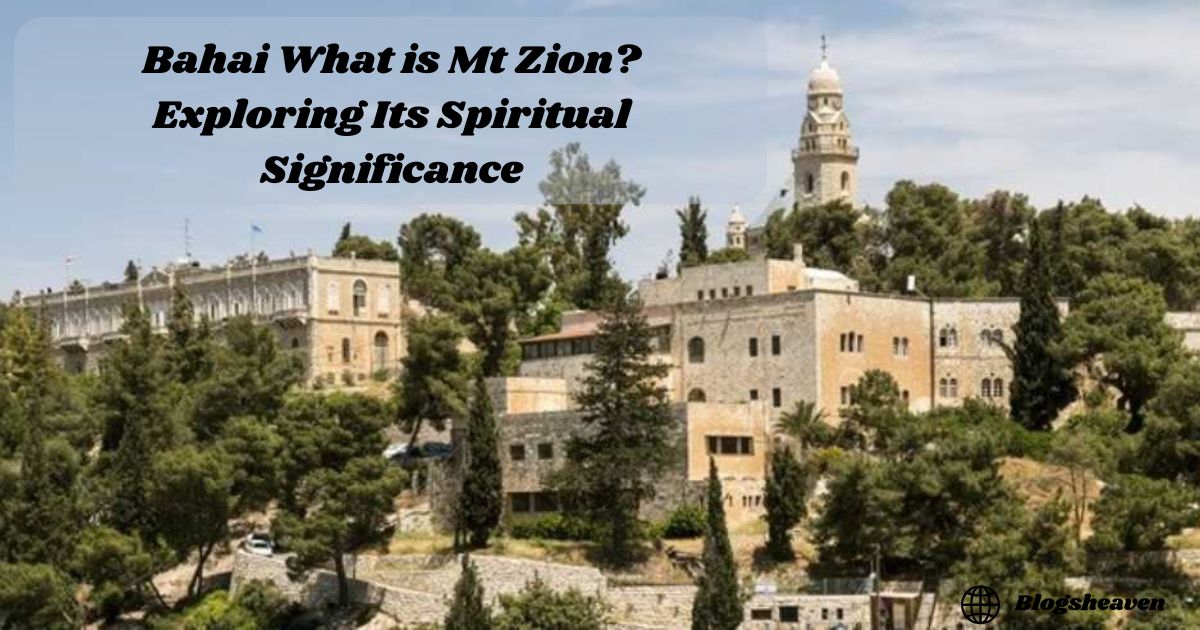Mount Zion holds deep significance for many religious traditions, and it has a profound place in the Bahá’í Faith as well. While the world views it largely through the lens of Judaism and Christianity, the Bahá’í interpretation brings a unique perspective to Mount Zion, connecting it to themes of unity, world peace, and spiritual renewal. In this article, we’ll delve into what Mount Zion means within the Bahá’í Faith, how it fits into the broader context of Bahá’í teachings, and why it serves as a beacon of hope and guidance for Bahá’ís around the world.
Origins and Symbolism of Mount Zion
Mount Zion has appeared in religious texts and history as a symbol of spiritual fulfillment and divine presence. In the Bible, it was the site of King David’s city and, later, the temple built by his son Solomon. This history imbued it with sacred significance for Jewish and Christian traditions, representing divine promises and prophecies.
In the Bahá’í view, however, Mount Zion is not merely a place of ancient religious legacy. Instead, it symbolizes a higher spiritual purpose. Bahá’u’lláh, the Prophet-Founder of the Bahá’í Faith, redefines its meaning, portraying it as a symbol of a world united under the principle of oneness. For Bahá’ís, Mount Zion is less about a geographical location and more about an ideal—the coming together of humanity as one family.
Bahá’u’lláh’s Teachings on Mount Zion
Bahá’u’lláh, who proclaimed the Bahá’í Faith in the mid-19th century, often referred to Mount Zion in his writings. He emphasized its role as a place of spiritual transformation. In his teachings, Mount Zion represents the unity of all religions and the arrival of a new age where humanity will transcend divisions of race, nationality, and creed. Bahá’u’lláh’s vision of Zion is a global one, free from limitations of borders or conflicts.
The Symbolism of Mount Zion in Bahá’í Writings
Bahá’í scripture frequently refers to Zion as a symbol of hope and renewal. Bahá’u’lláh envisioned a time when Mount Zion would witness the harmony of humanity. In this sense, Zion isn’t simply a mountain but rather an elevated state of consciousness and faith, an aspiration that drives Bahá’ís to work toward unity and peace in the world.
In the Kitáb-i-Aqdas, the Bahá’í Faith’s most sacred book, Bahá’u’lláh refers to Jerusalem and Zion as symbols of divine wisdom. For Bahá’ís, Mount Zion serves as a reminder to seek divine guidance and act as agents of peace and unity in their communities. This interpretation reflects Bahá’í beliefs about the oneness of religion and the progressive revelation of spiritual truth.
The Significance of Mount Carmel in Bahá’í History
While Mount Zion holds symbolic value, Mount Carmel in Haifa, Israel, is of particular significance in Bahá’í history. Bahá’u’lláh declared Mount Carmel as a holy place, and it now serves as the site of the Bahá’í World Centre. This complex houses the Shrine of the Báb, who was Bahá’u’lláh’s forerunner, along with administrative buildings vital to the Bahá’í community. For Bahá’ís, Mount Carmel represents the physical realization of spiritual unity, making it a focal point for Bahá’í pilgrimage.
The connection between Mount Carmel and Mount Zion serves to deepen the spiritual resonance of both locations within Bahá’í teachings. While Mount Zion represents a symbolic aspiration, Mount Carmel offers a tangible place for spiritual connection and growth. Together, they illustrate how the Bahá’í Faith embraces both physical and spiritual elements to convey its message of unity.
Mount Zion as a Prophetic Symbol
The concept of Zion appears in the prophecies of the world’s major religions, each hinting at a time when humanity will experience peace and justice. The Bahá’í Faith regards these prophecies as signs of a single divine plan. Bahá’ís believe that the promises associated with Mount Zion will be fulfilled through the establishment of a peaceful and just world, one that respects the diversity of cultures, beliefs, and identities.
Zion and the Oneness of Humanity
At the heart of the Bahá’í understanding of Zion is the concept of the oneness of humanity. This principle underscores all Bahá’í teachings, representing a world that is free from prejudice, division, and conflict. Bahá’ís work toward this vision in their communities, aiming to create a global society where everyone contributes to the common good. In this sense, Mount Zion becomes an emblem of the Bahá’í commitment to inclusivity and cooperation.
The Role of Justice in the Bahá’í Interpretation of Mount Zion
Justice is central to Bahá’í teachings, and it is closely linked to the concept of Zion. Bahá’u’lláh taught that justice is the foundation of lasting peace. Bahá’ís believe that the spiritual fulfillment represented by Zion can only be achieved when societies embrace fairness and equity. This pursuit of justice aligns with Bahá’í efforts to address social inequalities and promote human rights around the world.
Mount Zion and the Covenant of Bahá’u’lláh
The Bahá’í Faith has a unique structure known as the Covenant, which serves to protect and guide the Bahá’í community. Bahá’u’lláh’s Covenant emphasizes the unity of Bahá’ís and reinforces the principle of oneness. This Covenant, in many ways, reflects the promises associated with Mount Zion—a place of unity, where all people come together in harmony. The Covenant of Bahá’u’lláh inspires Bahá’ís to uphold these ideals and work for a united world.
The Relevance of Mount Zion in Modern Times
In a world marked by challenges and conflicts, the Bahá’í vision of Mount Zion is more relevant than ever. Bahá’ís believe that humanity stands at a pivotal point in its spiritual evolution, one that requires a commitment to unity and peace. Mount, in this sense, serves as a guiding light, encouraging individuals to move beyond personal and national interests for the benefit of all humankind.
The Global Bahá’í Community and the Vision of Zion
Bahá’ís around the world engage in various activities aimed at promoting unity, education, and service. These efforts, known as core activities, include study circles, children’s classes, and youth programs. Through these initiatives, the Bahá’í community seeks to bring the vision of Zion into reality by fostering understanding and collaboration among people of diverse backgrounds.
Mount Zion in Relation to the Bahá’í House of Worship
The Bahá’í Faith has established Houses of Worship in various parts of the world, each serving as a space for prayer, reflection, and service to humanity. These temples embody the spirit of Mount by welcoming individuals from all faiths to worship together. They are open to everyone, regardless of background or belief, reflecting the Bahá’í vision of unity and inclusivity.
The Importance of Pilgrimage in Bahá’í Life
Pilgrimage holds a special place in Bahá’í practice, offering believers a chance to connect deeply with the sacred teachings. The Bahá’í pilgrimage, which takes place in Haifa and Akka, allows Bahá’ís to experience the spiritual atmosphere of locations that hold historical and spiritual importance. For many Bahá’ís, the journey to these holy sites is a way of experiencing the spirit of Zion firsthand.
Conclusion
Mount Zion, within the Bahá’í Faith, represents more than just a geographical location. It embodies the ideals of unity, justice, and spiritual growth. While its roots may lie in ancient history, its significance is forward-looking, capturing the Bahá’í vision of a world united under divine principles. By understanding Mount in this context, one can appreciate the Bahá’í commitment to building a peaceful, just, and interconnected world.
FAQs
What does Mount Zion represent in the Bahá’í Faith?
Mount symbolizes unity, justice, and spiritual renewal, reflecting the Bahá’í vision of a peaceful world.
Why is Mount Carmel significant to Bahá’ís?
Mount Carmel is home to the Bahá’í World Centre and serves as a sacred site for pilgrimage and administration.
How does the Bahá’í Faith view the concept of justice?
Bahá’ís believe that justice is essential for peace and is a core aspect of fulfilling the vision of it.
What is the Bahá’í Covenant?
The Covenant of Bahá’u’lláh provides guidance for the Bahá’í community, ensuring unity and continuity of the Faith.
What are Bahá’í Houses of Worship?
Bahá’í Houses of Worship are inclusive spaces for prayer and reflection, open to people of all beliefs.











